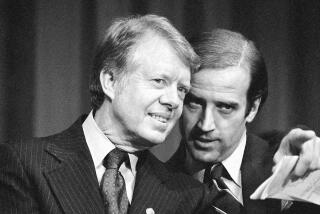Soviets Hail 1975 Helsinki Accords : Focus on Detente but Ignore Human Rights Provisions
- Share via
MOSCOW — The Soviet Union is hailing the 10-year-old Helsinki accords as a keystone of detente in Europe while at the same time shrugging off Western charges that the Kremlin is violating the human rights provisions of the agreement.
Indeed, KGB security chief Victor M. Chebrikov has vowed to eliminate any remaining “anti-state activities by hostile elements”--Soviet shorthand for dissidents.
In the 1975 Helsinki accords, the Soviet Union feels it has achieved its goal of nailing down post-World War II borders in Europe, and since then, it has crushed a home-grown human rights network that had been set up to monitor Soviet compliance with the accords, Western diplomats say.
So the Kremlin has a lot to celebrate when the foreign ministers of 33 European countries, the United States and Canada assemble in Helsinki next week for a 10th anniversary observance of the successful conclusion there of the Conference on Security and Cooperation in Europe.
Senior American officials, however, have said that the United States will use the meeting to accuse the Soviet Union of violating provisions of the accords and of amassing an even more deplorable human rights record in the decade since the agreements were signed.
East-West Clashes Expected
As a result, the conference in the Finnish capital seems certain to turn into another East-West confrontation, such as the recent Ottawa meeting devoted to a review of the human-rights aspects of the accords.
Secretary of State George P. Shultz and new Soviet Foreign Minister Eduard A. Shevardnadze are expected to meet during the conference and may advance the planning for the U.S.-Soviet summit conference set for Nov. 19-21.
But Shultz is also reported to be planning to raise U.S. human rights concerns with Shevardnadze, who will be making his world debut as his country’s top diplomat, and that is likely to cool the atmosphere.
The 1975 conference, attended by the 35 countries to be represented in Helsinki next week, produced a code for political and economic cooperation as well as a set of principles aimed at assuring civil liberties.
It was considered a triumph of the East-West detente, which flourished in the early 1970s but later crumbled with the Soviet invasion of Afghanistan in the closing days of 1979.
Signed by Brezhnev, Ford
The so-called “Final Act” that came out of the original Helsinki talks was signed by the late Soviet President Leonid I. Brezhnev and by President Gerald R. Ford, who said it would be judged not by the promises that were made but by “the promises we keep.”
Western nations stressed the pledges to provide greater freedom of expression and an expanded right to travel, both sharply restricted in Communist countries. The Soviets, however, focused on language endorsing the permanence of European frontiers after World War II and the prescription for “non-interference” with sovereign states.
Despite its sweeping pledge in 1975 to expand human rights, the Kremlin shows no interest in lifting restrictions on dissent, travel or emigration that have been the main targets of Western critics.
The government’s attitude toward criticism from its own citizens was expressed by KGB director Chebrikov in a recent issue of Kommunist, a party journal.
“These (hostile) elements are embarking on their road under influence from abroad,” he said. “They are outcasts, not representing any classes or strata in Soviet society, and they act in the interest of foreign intelligence services and anti-Soviet centers.”
Symbol of Dissent
Also, a Foreign Ministry spokesman recently justified the internal exile of Andrei D. Sakharov, a Nobel Prize-winning physicist, on grounds that he talked too much with foreigners and became a symbol of dissent.
Sakharov and his wife, Yelena Bonner, were leading figures in the human rights cause here during the late 1970s, but he was exiled to Gorky, a city closed to foreigners about 250 miles east of Moscow, more than five years ago.
Nearly all of Moscow’s other rights activists have been jailed, forced to leave the country or sent into internal exile since a government crackdown began in the late 1970s.
But the Kremlin view is that Western concern about such matters is merely an excuse “to meddle in our internal affairs . . . to inspire and coordinate activities of the hostile elements against Soviet state and social structures,” as Chebrikov put it.
The Soviet Committee for European Security and Cooperation, reviewing the 10 years since the Helsinki agreement, insists that the Soviet Union has an unblemished record on human rights questions.
“In the Soviet Union, the (Helsinki) Final Act’s provisions on respect for human rights and fundamental freedoms, including the freedom of thought, conscience, religion and belief are fully observed,” the committee said in a recent booklet.
It charged, however, that the United States violates the rights of its citizens by tolerating high unemployment, racism and sexism.
More to Read
Sign up for Essential California
The most important California stories and recommendations in your inbox every morning.
You may occasionally receive promotional content from the Los Angeles Times.













